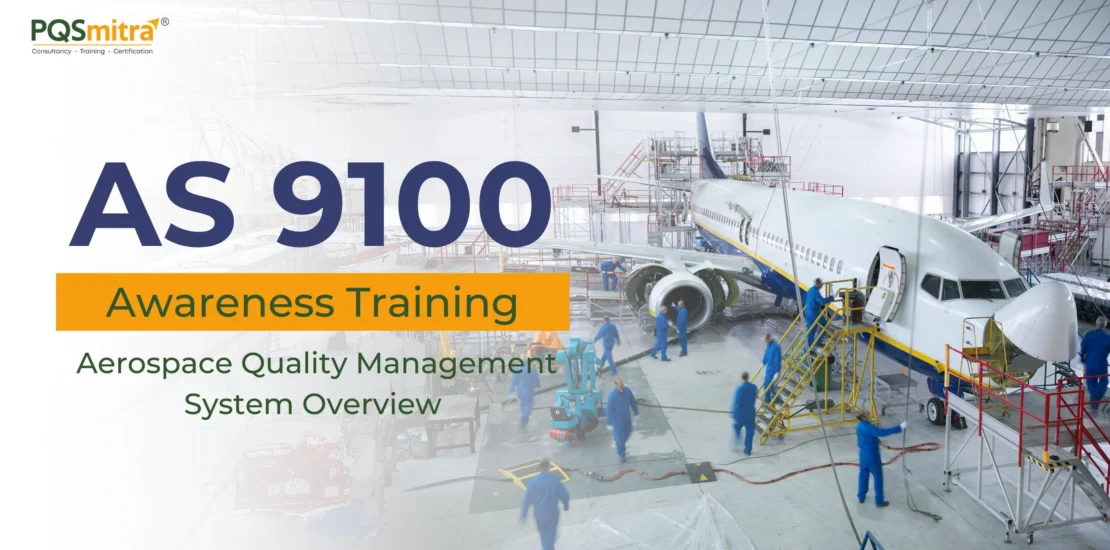- February 22, 2025
- Posted by: PQS_Mitra_Main_Access
- Category: ISO Certification

Introduction
In the aerospace industry, precision, consistency, and safety aren’t just expectations—they are non-negotiable. Whether it’s the design of an aircraft component or the delivery of maintenance services, there is zero room for error. That’s why the aerospace sector follows some of the world’s most stringent quality standards.
AS 9100, the internationally recognized Quality Management System (QMS) standard for aviation, space, and defense organizations, is central to meeting these expectations. It builds upon ISO 9001 and adds specific requirements for aerospace safety, product reliability, and regulatory compliance.
But having the system in place is only one part of the story. Ensuring that teams across the organization understand and engage with the standard is what drives its success.
Understanding What’s at Stake
In an industry where lives are on the line, even a minor lapse in quality can have catastrophic consequences. The complexity of aerospace operations—often involving multiple suppliers, regulatory bodies, and strict customer demands—makes it essential to have a robust and well-understood QMS.
AS 9100 addresses key aerospace concerns such as:
- Risk-based thinking and decision-making
- Configuration management
- Product safety and counterfeit part prevention
- Operational traceability
- Supplier control and accountability
It provides a structure to ensure that every component, process, and person contributes to the highest levels of performance and safety. However, without awareness and training, these systems can remain misunderstood or poorly implemented.
The Importance of Building Awareness in Aerospace Teams
Compliance in aerospace isn’t just the responsibility of the quality department. It requires active involvement from engineering, production, procurement, logistics, and leadership teams. Here’s where awareness training becomes vital.
When staff members understand the why behind AS 9100, they become proactive in maintaining the integrity of the system. They start to:
- Identify potential risks in advance
- Recognize nonconforming parts or procedures
- Report issues transparently and without fear
- Collaborate better with suppliers and partners
- Document and follow processes with consistency
Awareness isn’t just about knowing what the standard says—it’s about internalizing its intent and applying it on the ground.
Common Challenges Without Training
Organizations that pursue certification without proper awareness often face these issues:
- Miscommunication between departments
- Incomplete or inconsistent documentation
- Lack of traceability in processes or parts
- Delayed responses during audits
- Gaps in supplier performance monitoring
These issues don’t just affect compliance—they also delay production, damage reputations, and increase costs. Training helps prevent these problems by ensuring that everyone is speaking the same quality language.
Why Awareness Training Should Be the First Step
Before internal audits, before customer inspections, and even before certification planning, awareness training lays the foundation. It introduces participants to:
- The core principles and structure of AS 9100
- Differences between AS 9100 and ISO 9001
- Key terms such as product safety, operational risk, and traceability
- The role of each function in maintaining quality
- How AS 9100 supports continual improvement
This helps teams align their day-to-day activities with aerospace-specific requirements, contributing to a more effective and audit-ready QMS.
Embedding AS 9100 Principles Across the Organization
Awareness training encourages a mindset shift—from reactive quality checks to proactive quality planning. This shift helps:
- Foster a culture of accountability
- Improve communication between departments
- Standardize processes and reduce variation
- Drive better supplier relationships
- Achieve higher customer satisfaction scores
With a shared understanding, even complex requirements become manageable, and compliance becomes a part of routine operations—not just a certification goal.
Conclusion
In aerospace, quality is not optional—it is mission-critical. AS 9100 provides the framework, but it’s awareness that ensures every team member contributes to the system’s success.
When people understand their role in delivering safe, reliable, and compliant products or services, organizations gain more than certification. They build trust—with customers, regulators, and within the team.
PQSmitra offers AS 9100 awareness training, delivered online or onsite, with certification. This training helps aerospace businesses lay the groundwork for strong quality management by turning knowledge into action across the organization.
Leave a Reply Cancel reply
Kindly submit a business inquiry online and we will get back to you!
OR
Call us on 022-2893 8687 | +91-9820204373
